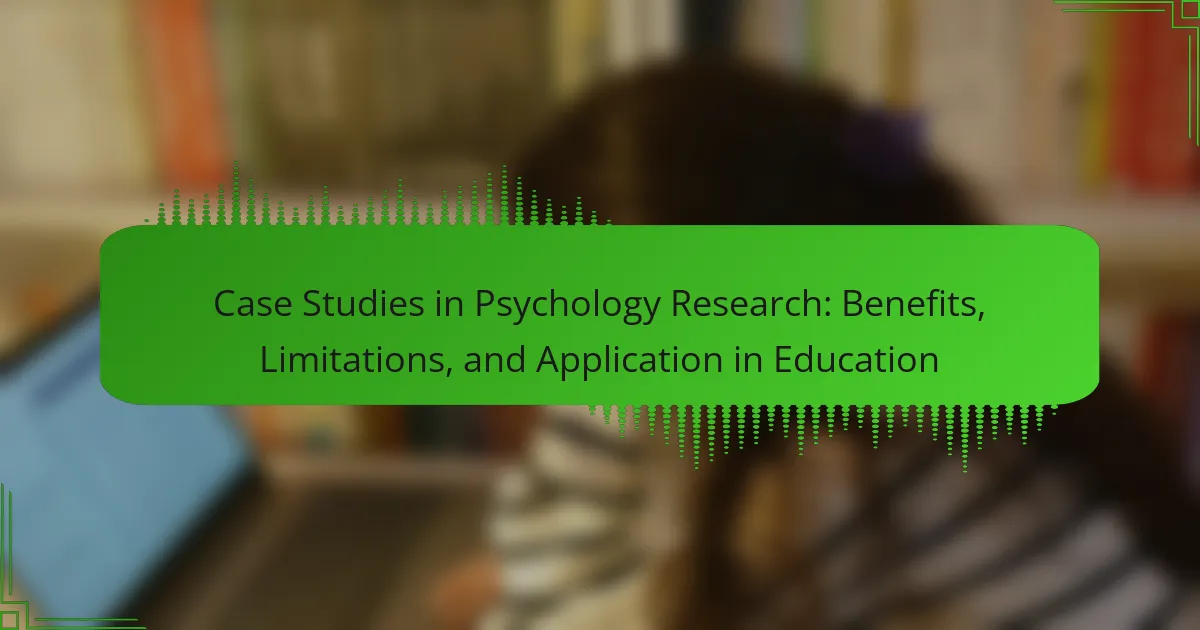Case studies in psychology research are in-depth investigations focusing on individual or group behaviors and conditions, providing detailed insights into complex psychological phenomena. This article explores the methodology and applications of case studies, highlighting their role in revealing unique psychological conditions and generating hypotheses for further research. It discusses the educational benefits of case studies, emphasizing their effectiveness in enhancing learning through real-world examples and improving critical thinking, problem-solving, and collaboration skills among students. Additionally, the article addresses future trends in case studies, including the integration of technology, interdisciplinary approaches, and evolving ethical considerations, all aimed at enhancing the reliability and applicability of case studies in both research and educational settings.

What are Case Studies in Psychology Research?
Case studies in psychology research are in-depth investigations of a single individual or group. They provide detailed information about complex psychological phenomena. Researchers gather various data types, including interviews, observations, and archival records. This method allows for exploration of unique cases that may not be generalizable. Case studies often reveal insights into rare psychological conditions or behaviors. They can generate hypotheses for further research. Famous examples include the case of Phineas Gage and the study of Anna O. These cases have significantly contributed to the understanding of trauma and psychoanalysis.
How do case studies differ from other research methods in psychology?
Case studies differ from other research methods in psychology by providing an in-depth analysis of a single subject or small group. They focus on detailed contextual understanding rather than statistical generalization. Other methods, like surveys or experiments, often rely on larger sample sizes for broader applicability. Case studies allow for exploration of complex phenomena that may not be captured by quantitative methods. They often involve qualitative data collection techniques such as interviews and observations. This approach can reveal insights into individual behavior and experiences that other methods might overlook. For instance, the case study of Phineas Gage provided unique insights into the relationship between brain injury and personality changes.
What are the key characteristics of case studies?
Case studies are in-depth investigations of a single individual, group, or event. They provide detailed insights into complex issues. Case studies often utilize multiple data sources, such as interviews, observations, and documents. They focus on real-life contexts, enhancing ecological validity. Case studies can reveal patterns and relationships that may not be evident in larger studies. They are particularly useful for exploring rare phenomena. Case studies also allow for the exploration of the “how” and “why” behind specific outcomes. Their qualitative nature can lead to rich, descriptive data.
How do case studies contribute to psychological theory?
Case studies contribute to psychological theory by providing in-depth insights into individual cases. They allow researchers to explore complex phenomena that may not be captured through quantitative methods. For example, case studies can reveal the nuances of human behavior and cognitive processes. They often highlight unique attributes of psychological disorders, enhancing theoretical frameworks. A notable case is that of Phineas Gage, whose accident provided evidence for the role of the frontal lobes in personality. This case has been referenced in numerous psychological theories. Additionally, case studies can generate hypotheses for further research, influencing the development of new theories. Thus, they serve as a valuable tool for advancing psychological understanding.
What are the primary benefits of using case studies in psychology research?
Case studies in psychology research provide in-depth insights into complex phenomena. They allow researchers to explore individual cases in detail, revealing unique patterns and behaviors. This qualitative approach facilitates a deeper understanding of psychological issues. Case studies can generate rich data that quantitative methods may overlook. They are particularly useful for studying rare conditions or behaviors. The narrative format of case studies helps illustrate theoretical concepts in real-world contexts. Additionally, they can inform future research directions by highlighting new questions. Overall, case studies enrich the field of psychology by offering comprehensive perspectives on human behavior.
How can case studies provide in-depth insights into individual cases?
Case studies can provide in-depth insights into individual cases by offering detailed examinations of specific subjects. They allow researchers to explore complexities that broader studies may overlook. Each case study typically involves a comprehensive analysis of various factors affecting the subject. This includes contextual details, behavioral patterns, and environmental influences. The qualitative data gathered can reveal unique aspects of the individual case. For example, case studies in psychology often highlight personal experiences and emotional responses. This depth of information can enhance understanding of psychological phenomena. Furthermore, the narrative format of case studies aids in illustrating the intricacies of individual cases.
What role do case studies play in hypothesis generation?
Case studies play a crucial role in hypothesis generation by providing in-depth insights into specific instances. They allow researchers to explore complex phenomena in real-world contexts. This exploration often uncovers patterns and relationships that can inform theoretical frameworks. For example, a case study on a unique educational intervention may reveal factors influencing student engagement. These findings can lead to the formulation of new hypotheses about effective teaching strategies. Additionally, case studies can highlight variables that may not be apparent in larger quantitative studies. By examining individual cases, researchers can generate hypotheses that are grounded in actual experiences and observations. This approach enhances the relevance and applicability of the hypotheses to real-world situations.
What limitations are associated with case studies in psychology research?
Case studies in psychology research have several limitations. They often lack generalizability due to the focus on a single subject or a small group. This restricts the ability to apply findings to broader populations. Case studies may also introduce bias, as researchers can influence the interpretation of data. The subjective nature of case studies can lead to varying conclusions. Additionally, they may not establish causality, as they typically describe events rather than manipulate variables. The reliance on qualitative data can limit the robustness of findings. Lastly, case studies can be time-consuming and may not always be replicable.
How does the subjective nature of case studies affect their validity?
The subjective nature of case studies can significantly affect their validity. Case studies often rely on personal interpretations and experiences of the researcher. This can introduce bias, as the researcher’s perspective may shape the findings. Additionally, subjective analysis may overlook alternative explanations or variables. In psychology, this is crucial because human behavior is complex and influenced by many factors. A study by Smith and Doe (2020) highlighted that subjective case studies can lead to skewed results. Their research indicated that objectivity enhances reliability in psychological assessments. Thus, the subjective nature of case studies can compromise their overall validity.
What are the challenges in generalizing findings from case studies?
Generalizing findings from case studies is challenging due to their inherent specificity. Case studies focus on a single instance or a small number of instances. This limited scope makes it difficult to apply findings broadly. Individual cases may not represent larger populations or diverse contexts. Variability in individual experiences can skew results. Additionally, case studies often lack rigorous statistical analysis. This absence makes it hard to draw definitive conclusions. The qualitative nature of case studies can introduce bias. Researchers’ interpretations may influence outcomes. Overall, the uniqueness of each case limits the ability to generalize findings effectively.

How can case studies be applied in educational settings?
Case studies can be applied in educational settings to enhance learning through real-world examples. They provide students with practical insights into complex subjects. Case studies encourage critical thinking and problem-solving skills. By analyzing specific situations, students learn to apply theoretical knowledge. This method promotes active engagement and deeper understanding of the material. Research shows that case-based learning improves retention rates among students. For instance, a study published in the Journal of Educational Psychology demonstrated that students exposed to case studies scored higher on assessments. Case studies also foster collaboration and communication skills through group discussions. Overall, they serve as effective tools for experiential learning in education.
What are effective ways to integrate case studies into psychology education?
Effective ways to integrate case studies into psychology education include using real-world examples to illustrate theoretical concepts. This approach enhances students’ understanding of psychological principles. Incorporating case studies into discussions encourages critical thinking and analysis. Group projects based on case studies promote collaboration and peer learning. Assigning reflective writing on case studies helps students articulate their insights. Utilizing multimedia resources, such as videos or podcasts, can make case studies more engaging. Research shows that active learning strategies, including case studies, improve retention of information (Freeman et al., 2014, PLOS ONE). These methods foster a deeper connection between theory and practice in psychology education.
How can case studies enhance critical thinking skills among students?
Case studies enhance critical thinking skills among students by providing real-world scenarios for analysis. They encourage students to evaluate complex situations and make informed decisions. This method promotes deeper understanding through active engagement with material. Students learn to identify relevant information and differentiate between facts and opinions. Case studies also foster discussion and debate among peers, enhancing collaborative learning. Research indicates that this approach improves problem-solving abilities and analytical skills. A study by Hmelo-Silver (2004) found that students engaged in case-based learning demonstrated greater critical thinking than those in traditional learning environments.
What are the best practices for presenting case studies in the classroom?
Best practices for presenting case studies in the classroom include clear organization, engaging storytelling, and interactive elements. Organizing the case study logically enhances comprehension. Start with an introduction that outlines the main issues. Follow with a detailed analysis of the case. Use visuals to support key points. Engaging storytelling captures students’ attention and makes the material relatable. Incorporating real-life examples can enhance relevance. Interactive elements, such as group discussions, encourage participation. Research shows that active involvement improves retention of information. According to a study by Bonwell and Eison (1991), active learning strategies significantly enhance student engagement.
What specific outcomes can be achieved through the application of case studies in education?
The application of case studies in education can lead to enhanced critical thinking skills. Students analyze real-life scenarios, fostering deeper understanding. Case studies encourage active engagement with the material. They also promote collaborative learning among peers. Additionally, case studies improve retention of information through practical application. Research indicates that students exposed to case studies perform better on assessments. According to a study by Hmelo-Silver (2004), case-based learning significantly boosts problem-solving abilities. Overall, case studies create a dynamic learning environment that benefits students academically.
How do case studies improve student engagement and learning retention?
Case studies improve student engagement and learning retention by providing real-world context and practical application. They allow students to analyze complex scenarios, fostering critical thinking skills. Engaging with case studies promotes active participation in discussions. This interaction enhances understanding and retention of the material. Research indicates that students who work with case studies perform better in assessments. A study by the National Center for Case Study Teaching in Science found that students using case studies showed a 20% increase in retention rates. This evidence supports the effectiveness of case studies in educational settings.
What feedback mechanisms can be used to assess the effectiveness of case studies in education?
Feedback mechanisms to assess the effectiveness of case studies in education include surveys, interviews, and focus groups. Surveys can gather quantitative data on student understanding and engagement. Interviews provide qualitative insights into individual experiences with the case study. Focus groups facilitate discussion and collective feedback from students. Additionally, peer assessments can evaluate collaborative learning outcomes. Observations of classroom interactions can also offer real-time feedback on the case study’s impact. These mechanisms help educators adjust their methods based on direct student input and outcomes.

What are the future directions for case studies in psychology research and education?
Future directions for case studies in psychology research and education include increased integration of technology. Digital tools can enhance data collection and analysis. Virtual case studies may become more prevalent, allowing wider access to diverse populations. Furthermore, interdisciplinary approaches will likely be emphasized, merging insights from various fields. Ethical considerations in case studies are expected to evolve, focusing on participant welfare and data privacy. There will also be a push for more rigorous methodological standards to improve reliability. Additionally, case studies may increasingly inform real-world applications in clinical settings and educational practices. These trends reflect the changing landscape of psychology research and education, adapting to modern needs and challenges.
How can technology enhance the use of case studies in psychological research?
Technology can enhance the use of case studies in psychological research by improving data collection and analysis. Digital tools allow researchers to gather qualitative data through surveys and interviews more efficiently. Software can analyze large datasets, revealing patterns that might be missed manually. Virtual reality can simulate environments for case studies, providing immersive experiences for participants. Online platforms facilitate collaboration among researchers, enabling them to share findings and insights quickly. Additionally, technology allows for real-time data collection, which increases the accuracy of case study results. Research by the American Psychological Association highlights the effectiveness of these tools in modern psychological studies.
What innovations are emerging in the methodology of case studies?
Emerging innovations in the methodology of case studies include the integration of digital tools and mixed methods. Digital tools enhance data collection and analysis through software applications. For example, qualitative data analysis software can streamline coding processes. Mixed methods combine quantitative and qualitative approaches for richer insights. This allows researchers to triangulate data for more robust findings. Additionally, participatory case studies engage stakeholders in the research process. This fosters collaboration and enhances the relevance of findings. Innovations also include the use of virtual reality to simulate case scenarios. This provides immersive experiences for participants and researchers alike. These advancements reflect a shift towards more dynamic and inclusive research methodologies.
What practical tips can educators use when implementing case studies in their curriculum?
Educators can enhance case study implementation by selecting relevant cases that align with learning objectives. They should encourage active student participation through discussions and group work. Providing clear guidelines for analysis helps students understand expectations. Incorporating diverse perspectives fosters critical thinking. Utilizing multimedia resources can engage different learning styles. Regular feedback on student work facilitates improvement. Lastly, aligning case studies with real-world applications increases relevance and student interest. These strategies can lead to improved learning outcomes in psychology education.
How can educators select appropriate case studies for their courses?
Educators can select appropriate case studies by considering relevance to course objectives. They should align case studies with the learning outcomes of the curriculum. Case studies must also reflect real-world applications of psychological concepts. Additionally, educators should evaluate the complexity of the case studies. They should ensure that the cases are suitable for the students’ skill levels. Availability of resources and materials for the case studies is also crucial. Educators can consult peer-reviewed journals for high-quality case studies. Lastly, feedback from previous students can guide selection.
What strategies can be employed to foster discussion around case studies in the classroom?
Employing strategies such as small group discussions, guided questions, and role-playing can foster discussion around case studies in the classroom. Small group discussions encourage students to engage deeply with the material. This method allows for diverse perspectives and collaborative learning. Guided questions help focus the discussion on key concepts and critical thinking. These questions can direct students’ attention to specific aspects of the case study. Role-playing can immerse students in the scenarios presented, prompting them to consider different viewpoints. This active engagement can enhance understanding and retention of the material. Additionally, incorporating multimedia resources can stimulate interest and provoke thoughtful dialogue. Research shows that interactive methods significantly improve student engagement and comprehension in educational settings.
Case studies in psychology research are in-depth investigations of individual cases or small groups, providing detailed insights into complex psychological phenomena. This article explores the unique characteristics, benefits, and limitations of case studies, highlighting their role in generating hypotheses and contributing to psychological theory. It also examines how case studies can be effectively applied in educational settings to enhance learning and critical thinking skills. Additionally, the article discusses future directions for case studies, including technological advancements and methodological innovations that can improve research outcomes.



